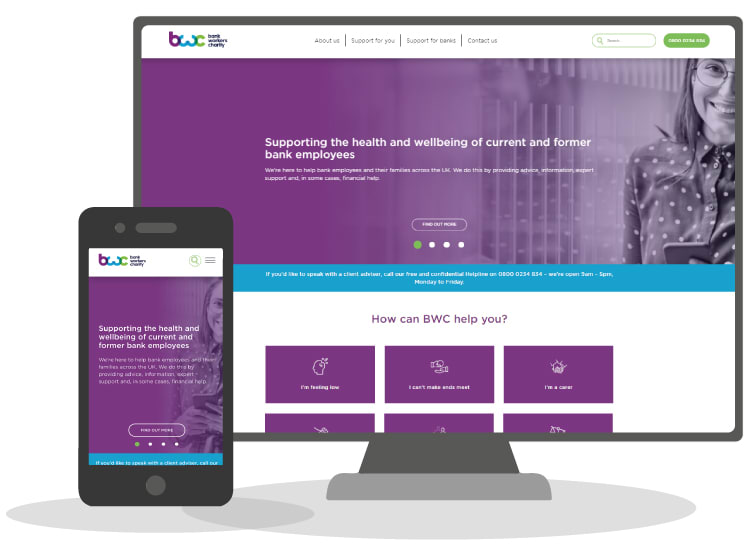Relationship support
Low moods usually pass, but what about when we feel sad for weeks, months or longer?
Lots of us live with depression day in, day out. It affects 1 in 5 of us at some point in our lives, so we’re not alone. But the good news is, there are plenty of things we can actively do to help manage our depression which can make a positive difference to how we feel.

Recognising depression
Most of us will, at some point in our lives, experience low mood or feeling down, which can last a few days or even stretch into a couple of weeks - it can often be linked to situations happening in our lives and how we cope and deal with the aftermath. Depression is more than simply feeling unhappy or fed up.
When we’re depressed, our low mood and other related mental and physical symptoms will carry on persistently for weeks and weeks, months or even years. The World Health Organisation says that it's one of the most disabling disorders there is, and it's surprisingly common, affecting one in five women and one in ten men in their lifetime.
While depression isn't something you can just ‘snap out’ of, it can be treated. There are many symptoms of depression, and they can vary from person to person. Here are some of the possible signs:
- Low mood that persists
- Feelings of hopelessness or that life isn't worth living
- Lack of motivation
- Poor sleep, insomnia or over tiredness
- Tearful or having extreme emotional responses in situations which usually you'd be able to handle, or for no reason at all
- Suicidal thoughts
- Difficulty focusing and concentrating on tasks
- Physical aches and pains
- No appetite, or comfort eating to excess
- Loss of interest or enjoyment in hobbies and activities
Treatment for depression
There are various treatments that can help manage and break the cycle of depression. Lifestyle changes can also play a key role in managing or recovering from depression. Making positive lifestyle changes, such as getting more exercise, improving sleep, cutting down on alcohol and eating healthily can all have a significant impact on your mental health. Some people may benefit from talking therapies, Cognitive Behavioural Therapy (CBT) or counselling and for some, prescribed medication may be necessary.
There isn't a simple cure for depression, but recovery is certainly possible.
Five tips for managing depression
- Do some exercise – Staying active can help to alleviate symptoms of depression, so start gentle with a slow 20-minute walk and gradually increase the frequency.
- Practice self-care – Making time to look after yourself and focusing on the things you enjoy, whether it’s reading a book or being in nature, can help to boost your mood and improve your wellbeing.
- Join a support group – Connecting with others who understand what you’re feeling and sharing your own story can help in your own recovery, as well as offer encouragement and support to others with similar experiences.
- Talk with a therapist – Talking therapy such as cognitive behavioural therapy (CBT) can help you explore and change how you think about life, and free yourself from unhelpful patterns of behaviour. It can help you to deal with overwhelming problems in a more positive way.
- Share how you’re feeling – Confiding in a friend, family member or your GP can help you feel supported and less alone. If it feels awkward at first, give it time. Make talking about your feelings something that you do.
Need help managing depression? The Bank Workers Charity (BWC) offer free and confidential apps for bank employees, their partners, and children to help them look after their mental health and wellbeing.
Support for adults
My Possible Self is a research-led app which offers a holistic approach to mental health. It can help you to manage anxiety, tackle depression, ease stress and improve sleep.
Support for children and young people
Kooth provide a free, safe and anonymous wellbeing support service for children/young people aged 11-18 via peer-to-peer moderated forums, self-help articles, counselling sessions, self-help tools and more.
Access Kooth
To get in touch with BWC, call their free and confidential Helpline on 0800 0234 834 - they’re open Monday to Friday 9.00am to 5.00pm (except bank holidays). Or head to their website to speak with an adviser via their Live Chat.
BWC have refreshed their homepage to make it easier for you to learn more about their support services. Find out how they can support you, your partner, or children across a range of other areas too, including mental health conditions, caring responsibilities, debt and money management, bereavement, disability and long-term health conditions, housing issues, and in some cases, financial help.
Visit the Bank Workers CharityMore support
- LBG’s Employee Assistance Programme (Validium): 0800 9700 100
- TSB's Employee Assistance Programme: 0800 0856 348
- Mind mental health charity: https://www.mind.org.uk/
- Bank Workers Charity: 0800 0234 834 — https://www.bwcharity.org.uk/
- Samaritans: 116 123 — https://www.samaritans.org/
- NHS 'Every mind matters': https://www.nhs.uk/oneyou/every-mind-matters/
- NHS (including 111): https://www.nhs.uk/conditions/suicide/

And remember, if you’re an Accord member and need a chat about support at work, call the helpline on 0118 934 1808.
All of our team of advisors have been accredited in Mental Health First Aid by MHFA England.



